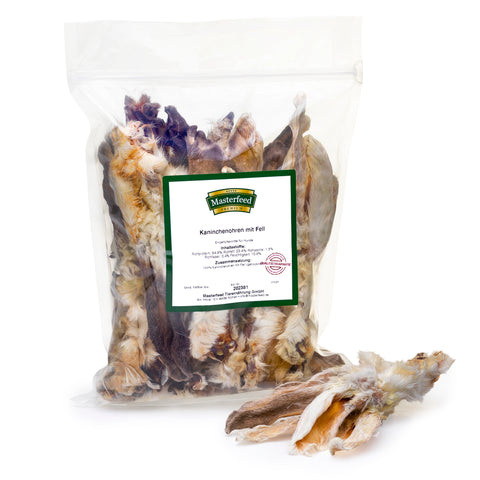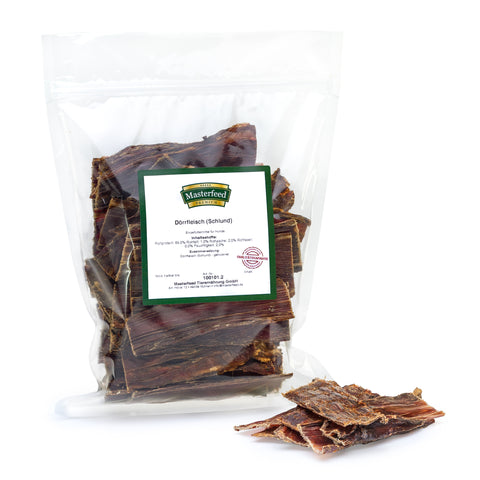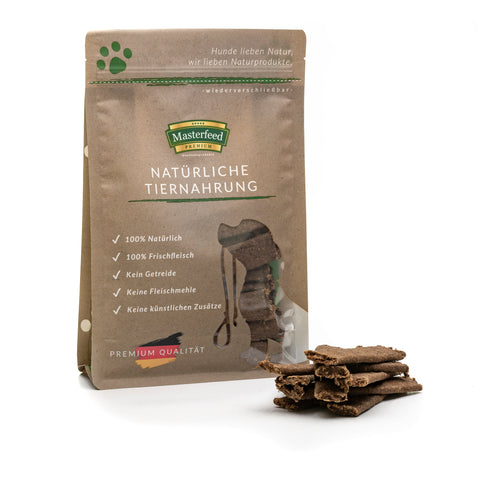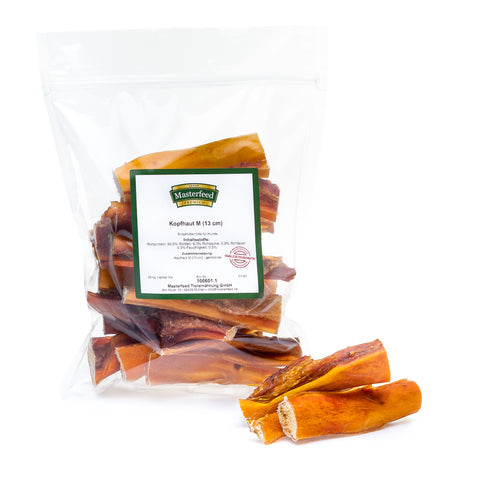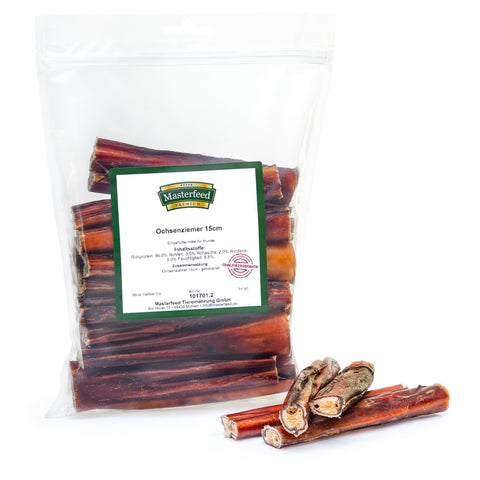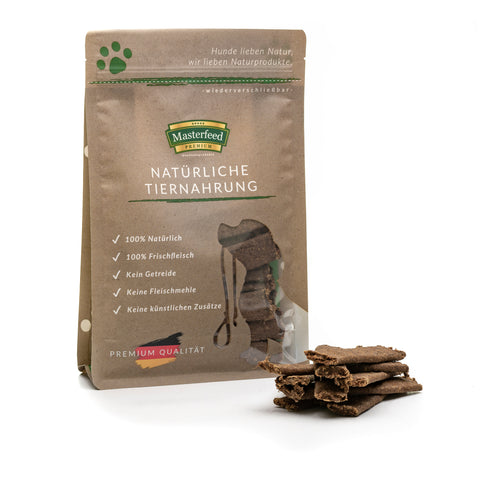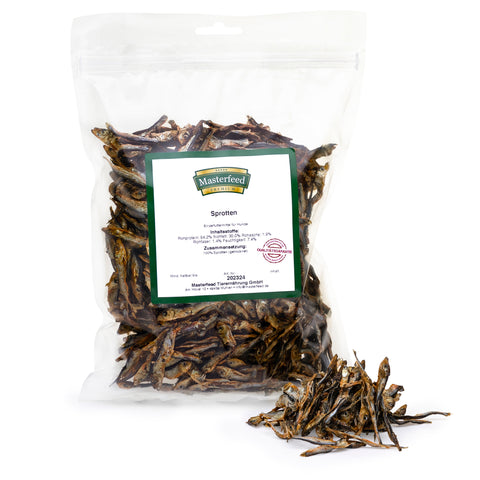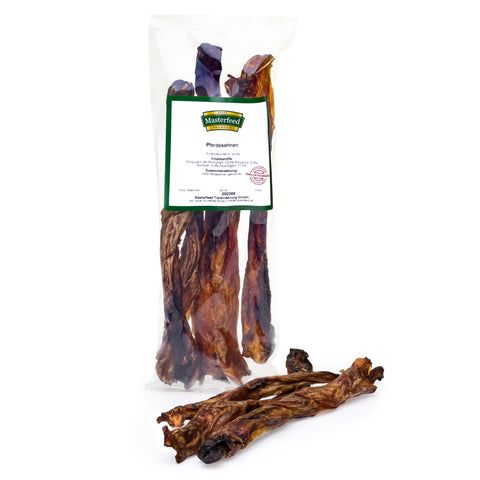We all know how important food is for dogs for dental health and exercise.
But which chews are suitable for which breed and how do you take different chewing habits into account?
The right choice of chews, whether for small dogs or large dogs, can significantly improve the quality of life and provide long-term support to the dog.
Why chews are important for dogs
Chews have a significant impact on a dog's dental health and well-being. They not only promote oral hygiene.
In addition, chews contribute to the natural satisfaction of the need to chew and provide mental stimulation.
These benefits are extremely important, as dogs need to take good care of their teeth to avoid cavities and prevent gum disease. Chews allow dogs to naturally reduce tartar, prevent unwanted behaviors, and improve overall well-being.
Additionally, chews provide a valuable way to channel excess energy into healthy activity, keeping them both physically and mentally balanced. Finally, chews are an excellent way to build a strong bond, whether through shared eating or simply observing their contentment.
Chews and dog breeds
Different dog breeds have specific chewing habits, which are reflected in their needs. While small dogs require more delicate chew treats, larger breeds prefer robust chews. This makes the chewing experience not only enjoyable but also optimally promotes dental health.
Chews for small dogs
Small dogs prefer fine and easy-to-chew snacks that are gentle on their sensitive teeth.
Choosing the right chews is not just about size, but also about safety.
Soft chew snacks are especially suitable for small dog breeds because they are gentle on their teeth. These products contribute to dental health and encourage active chewing behavior without the risk of tooth injury or fracture.
High-quality chews made with natural ingredients are essential to guarantee dogs maximum enjoyment and safety. The needs of small breeds should be optimally met with innovative and well-thought-out products.
Chews for large dogs
Strong dogs need stronger chews.
Large dog breeds, such as Great Danes or Bernese Mountain Dogs, require sturdy chews. You should make sure these chews are made of durable materials to withstand their powerful jaw muscles. It's important that the chew is large enough to keep your dog occupied while minimizing the likelihood of swallowing small pieces.
Solid bones or extra hard chews can be beneficial.
Choosing the right chews not only promotes dental health but also overall dental muscle strength, which can contribute to a balanced and content dog. Remember to closely monitor your dog's chewing behavior to ensure the item meets his needs.
With targeted chews for large dogs, you can optimize the balance between fun and functionality. This ensures your large four-legged friend stays fit and happy. Natural ingredients and thoughtful designs are key to long-lasting chewing fun and healthy oral hygiene.
Different chew snacks and their benefits
Chew snacks come in a variety of varieties, each with specific benefits for different dog breeds. But which type is best for your loyal companion?
For small dogs, softer, easy-to-chew snacks are ideal, as they're gentle on the teeth while still satisfying their urge to chew. These chews stimulate the small jaw muscles and promote healthy oral flora without putting pressure on the teeth.
In contrast, large dogs require more robust chews that meet their more intensive chewing needs and prevent tartar buildup. High-quality chew bones or beef ribs are particularly suitable, as they challenge their powerful bite while strengthening the jaw muscles.
Vegetarian options are an excellent choice for owners who value natural and environmentally friendly ingredients. These chews are often made with sweet potatoes or rice and also offer health benefits such as supporting digestion and providing essential nutrients.
Ultimately, choosing the right chew improves your dog's overall well-being. Optimize your selection for a healthy, happy future.
Popular dog toys for puppies
Puppies are dynamic explorers and need special chews that are gentle on their still sensitive teeth while satisfying their curiosity.
Tooth-friendly teething rings or soft chicken chews are ideal options.
To support the development of healthy teeth, make sure your dog's chews are easily digestible and natural. They should be made of high-quality, hypoallergenic materials to avoid allergic reactions and promote overall health.
Finally, it's crucial to always consider the breed and its specific needs when choosing puppy chews. A tailored choice can optimize dental care and positively influence your puppy's chewing behavior. This not only prevents potential health problems but also strengthens the bond between you and your little darling.
Select chews according to breed
Choosing the right chew, tailored to the specific needs of each dog breed, can make a big difference. Breeds with strong jaws require robust chews, while more sensitive breeds benefit from softer options that accommodate more sensitive teeth.
For smaller dog breeds, chews that are easy to chew and digest, such as chicken and rice rolls, are particularly suitable. Larger dogs appreciate the challenge of harder products that not only last longer but also help prevent tartar buildup. With the right selection, you can not only promote your dog's dental health but also enhance their well-being and support a happy, healthy life.
Rottweilers and their chews
Rottweilers are known for their powerful jaws and persistent chewing skills. These characteristics make it especially important to select appropriate chews that meet the needs of this impressive breed.
Large dog chews are ideal for Rottweilers because they strengthen their jaws.
An effective chew for Rottweilers could be a sturdy chew bone, for example, which not only promotes dental hygiene but also prevents boredom. High-quality natural products offer a healthy and appealing option that will also resist the urge to chew for a long time.
Rottweilers benefit from chews that support their mental and physical energy. Items such as sturdy dog toys or toothed chews with a beef or deer motif offer variety and promote dental health. The right choice not only strengthens the teeth but also contributes to mental balance. A specially tailored chew plan can help optimally support the strength and stability of a Rottweiler's powerful bite.
Labrador and suitable snacks
Labradors love their chews very much.
Labradors are known for their energy and playful nature. To maintain these qualities, appropriate snacks are crucial for a balanced diet. Chews made from natural ingredients are recommended, which not only relieve boredom but can also promote dental health. Products specifically adapted for Labradors offer the advantage of personalized nutritional support.
Their tireless chewing instinct requires suitable chews.
The ideal choices range from tasty treats - which both care for the teeth and make the Labrador's heart beat faster - to robust, long-lasting snacks that meet the need for intensive chewing phases.
Since Labradors can gain weight quickly, it's important to consider this aspect in your chew plan. By carefully selecting treats that are low in calories yet high in nutritional value, owners can contribute to their Labrador's optimal health. New research from 2023 shows how innovative chews can have a positive impact on the long-term health of this breed. Dedicated research and quality products make it possible to pamper your Labrador with joy and responsibility.
Natural vs. artificial chews
To make the right choice between natural and artificial chews, dog owners should consider their dogs' specific nutritional and chewing needs.
Natural chews are made from unaltered animal products and are often rich in nutrients.
These chews can promote optimal dental care by naturally reducing tartar and plaque.
Artificial chews, on the other hand, are characterized by a huge variety of colors, flavors and shapes.
Some synthetic products may contain additives or preservatives that are not ideal for every dog, so it is advisable to check the ingredients carefully.
According to recent research, both natural and artificial chews offer unique benefits. Their rational use can maximize a dog's well-being and satisfaction.
Understanding chewing behavior
Dogs' chewing behavior varies greatly depending on breed, age, and individual preferences. But why is chewing so important for dogs?
Essentially, chewing promotes dental health, reduces stress, and provides mental stimulation. It also strengthens the jaw muscles and helps release excess energy.
Studies show that dogs who regularly receive appropriate chews tend to exhibit less destructive behavior. It's important to select chews appropriate to the size, age, and needs of the breed.
For example, small breeds often require softer chews to avoid damaging their delicate teeth. Large dogs, on the other hand, benefit from more robust options that meet the strength requirements of their powerful jaws.
A deep understanding of chewing behavior helps select the optimal products, promoting not only physical health but also mental well-being.
Tips for the correct storage of chews
To preserve the freshness of the chews according to breed, they should be stored in a dry and cool place to preserve their nutritional value.
Moisture can quickly affect the structure of many small dog chews.
Make sure to store in airtight containers to prevent the ingress of pests or bacteria and ensure your furry friends' long-term enjoyment. By reading the labels, you can track specific manufacturer instructions.
In addition to avoiding direct sunlight, special chews for large dogs can be stored in sturdy storage containers to withstand biting attempts and prevent accidents. A well-thought-out organization system in your pantry can optimize the rotation of chews and prevent spoilage. This way, your faithful companion's treats will always be ready to enjoy and bring joy.
Common mistakes when buying chews
A common mistake is not considering chews by breed, which can lead to unsuitable products.
Many dog owners tend to purchase chews without thorough research, rather than considering their dogs' specific needs and preferences. This can make both small dog chews and large dog chews ineffective or even dangerous for their four-legged companions if the size or texture doesn't meet their expectations.
Likewise, some owners choose chews that aren't age- or health-appropriate. For young puppies or older dogs, you need products specifically formulated for their teeth and jaws to avoid injury or unnecessary stress.
Finally, it's essential to pay attention to the quality of your dog's chews by only purchasing certified products that contain the necessary nutrients. Trust transparent and reputable manufacturers to ensure your dog's health and happiness while providing them with an enriching and fulfilling chewing experience.
Conclusion: choose the best for your four-legged friend
Every dog has unique needs and it is crucial to consider these when choosing chews to promote health and well-being.
Choosing the right chews according to breed can significantly improve the quality of life of our beloved pets.
By understanding your dog's specific chewing habits and needs, you can maximize the benefits of the snacks.
A wide range of chews gives dog owners the opportunity to combine care and enjoyment.
The perfect chew snacks for small dogs and large dogs Chews should take into account both the physical condition and the character of the respective breed to achieve optimal results.
Ultimately, it's up to us to choose the best for our four-legged friends. Let us inspire you to make informed decisions and pave the way to a happy dog life.


